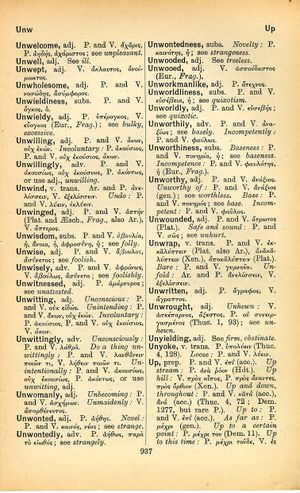up: Difference between revisions
καλῶς γέ μου τὸν υἱὸν ὦ Στιλβωνίδη εὑρὼν ἀπιόντ' ἀπὸ γυμνασίου λελουμένον οὐκ ἔκυσας, οὐ προσεῖπας, οὐ προσηγάγου, οὐκ ὠρχιπέδισας, ὢν ἐμοὶ πατρικὸς φίλος → Ah! Is this well done, Stilbonides? You met my son coming from the bath after the gymnasium and you neither spoke to him, nor kissed him, nor took him with you, nor ever once felt his balls. Would anyone call you an old friend of mine?
(Woodhouse 5) |
(CSV5) |
||
| Line 1: | Line 1: | ||
{{ | {{Woodhouse1 | ||
| | |Text=[[File:woodhouse_937.jpg|thumb|link={{filepath:woodhouse_937.jpg}}]]'''prep.''' | ||
P. and V. ἐπί (acc.). | |||
<b class="b2">Up stream</b>: P. ἀνὰ ῥόον (Hdt.). | |||
<b class="b2">Up hill</b>: V. πρὸς [[αἶπος]], P. πρὸς ἄναντες, πρὸς ὄρθιον (Xen.). | |||
<b class="b2">Up and down, throughout</b>: P. and V. [[κατά]] (acc.), ἀνά (acc.) (Thuc. 4, 72; Dem. 1277, but rare P.). | |||
<b class="b2">Up to</b>: P. and V. ἐπί (acc.). | |||
<b class="b2">As far as</b>: P. [[μέχρι]] (gen.). | |||
<b class="b2">Up to a certain point</b>: P. [[μέχρι]] του (Dem. 11). | |||
<b class="b2">Up to this time</b>: P. [[μέχρι]] τοῦδε, V. ἐς τόδʼ ἡμέρας (Eur., <b class="b2">Alc. 9</b>), P. and V. [[δεῦρο]] (Plat. and Eur., ''Heracl.'' 848); see [[hitherto]]. | |||
<b class="b2">Come up with, reach</b>: P. and V. ἐξικνεῖσθαι (gen.); see [[reach]]. | |||
<b class="b2">Overtake</b>: P. ἐπικαταλαμβάνειν; see [[overtake]]. | |||
<b class="b2">Well up in, versed in</b>: P. and V. [[ἔμπειρος]] (gen.). | |||
<b class="b2">Be well up in an author</b>: Ar. and P. πατεῖν (acc.) (Ar., <b class="b2">Av.</b> 471 and Plat., ''Phaedr.'' 273A). | |||
'''adv.''' | |||
P. and V. [[ἄνω]], Ar. and P. [[ἐπάνω]]. | |||
<b class="b2">Up and down</b>: P. and V. [[ἄνω]] [[κάτω]], [[ἄνω]] τε καὶ κάτω, P. [[ἄνω]] καὶ [[κάτω]]. | |||
<b class="b2">Hither and thither</b>: see under [[thither]]. | |||
<b class="b2">The up country</b>: P. ἡ μεσογεία; see [[inland]]. | |||
<b class="b2">Go up country</b>, v.: P. ἀνέρχεσθαι (Thuc. 8, 50), ἀναβαίνειν. | |||
<b class="b2">Be up</b> (<b class="b2">of time</b>), <b class="b2">be passed</b>: P. and V. παρελθεῖν (2nd aor. of παρέρχεσθαι). | |||
<b class="b2">Go up</b>: P. and V. ἀνέρχεσθαι, Ar. and P. ἀναβαίνειν. | |||
<b class="b2">Set up</b>: see under [[set]]. | |||
<b class="b2">Stand up</b>: P. and V. ἀνίστασθαι; see [[rise]]. | |||
<b class="b2">It is all up with me</b>: use P. and V. [[οἴχομαι]] (Plat.); see [[be undone. | |||
<b class="b2">Shall we say it was all up with these things?</b> P. πάντα ἔρρειν [[ταῦτα]]... φήσομεν; (Plat. Legg. 677C). | |||
}} | }} | ||
Revision as of 10:08, 21 July 2017
{{Woodhouse1
|Text=
prep.
P. and V. ἐπί (acc.).
Up stream: P. ἀνὰ ῥόον (Hdt.).
Up hill: V. πρὸς αἶπος, P. πρὸς ἄναντες, πρὸς ὄρθιον (Xen.).
Up and down, throughout: P. and V. κατά (acc.), ἀνά (acc.) (Thuc. 4, 72; Dem. 1277, but rare P.).
Up to: P. and V. ἐπί (acc.).
As far as: P. μέχρι (gen.).
Up to a certain point: P. μέχρι του (Dem. 11).
Up to this time: P. μέχρι τοῦδε, V. ἐς τόδʼ ἡμέρας (Eur., Alc. 9), P. and V. δεῦρο (Plat. and Eur., Heracl. 848); see hitherto.
Come up with, reach: P. and V. ἐξικνεῖσθαι (gen.); see reach.
Overtake: P. ἐπικαταλαμβάνειν; see overtake.
Well up in, versed in: P. and V. ἔμπειρος (gen.).
Be well up in an author: Ar. and P. πατεῖν (acc.) (Ar., Av. 471 and Plat., Phaedr. 273A).
adv.
P. and V. ἄνω, Ar. and P. ἐπάνω.
Up and down: P. and V. ἄνω κάτω, ἄνω τε καὶ κάτω, P. ἄνω καὶ κάτω.
Hither and thither: see under thither.
The up country: P. ἡ μεσογεία; see inland.
Go up country, v.: P. ἀνέρχεσθαι (Thuc. 8, 50), ἀναβαίνειν.
Be up (of time), be passed: P. and V. παρελθεῖν (2nd aor. of παρέρχεσθαι).
Go up: P. and V. ἀνέρχεσθαι, Ar. and P. ἀναβαίνειν.
Set up: see under set.
Stand up: P. and V. ἀνίστασθαι; see rise.
It is all up with me: use P. and V. οἴχομαι (Plat.); see [[be undone.
Shall we say it was all up with these things? P. πάντα ἔρρειν ταῦτα... φήσομεν; (Plat. Legg. 677C). }}

